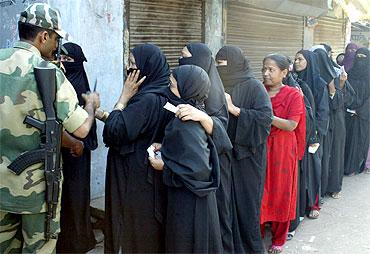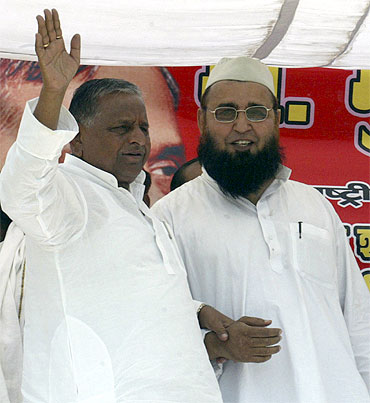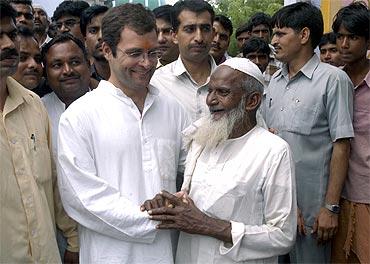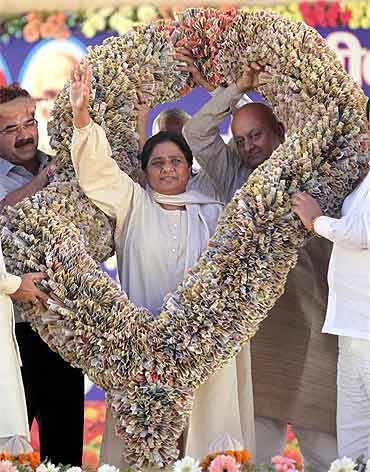 | « Back to article | Print this article |
The Muslim vote counts in 130 seats in UP
An interesting phenomenon of the UP assembly elections 2012 is the emergence of too many small Muslim political outfits, notes Dr Mohammad Sajjad.
In India's most populated province of Uttar Pradesh, there are 403 assembly seats, and in about 130 of these seats the Muslim vote matters a lot. Overall, around 18 per cent of the UP electorate is Muslim.
Muslims number about 20% in 70 aseembly seats, whereas they are between 30% and 45% in 20 seats in western Uttar Pradesh (Harit Pradesh), 10 seats of eastern Uttar Pradesh (Purvanchal), five seats of central Uttar Pradesh (Awadh), and one seat of Bundelkhand (Jhansi area).
With the shrinking support base of the Congress in the late 1980s, Muslims had switched over to Mulayam Singh Yadav's Samajwadi Party.
In the 2009 assembly election, Mulayam's proximity with the Bharatiya Janata Party's Kalyan Singh disenchanted the Muslims, and in the recent past Mulayam has been trying to win them back.
The Socialist movement's central agenda was to defend the political empowerment of the backward castes for which it maintained consistency in anti-Congressism. This has been more popular in eastern UP.
Mulayam has, however, not succeeded much in enlisting the support of the Pasmanda movement. His Muslim face, Azam Khan, may give competition to the Congress in Rampur; another Muslim face Kamal Faruqi is less likely to be of any help. He is supposed to have been with the allegedly tainted vice-chancellor of Aligarh Muslim University.
Please click Next to read further...
Mulayam has been trying to win back disenchanted Muslims
In UP politics, the Union government's treatment of the Aligarh Muslim University has historically been an important electoral factor.
Here the vice-chancellor, Professor P K Abdul Azis, a native of Kerala, has been facing charges of unprecedented irregularities, indicted by inquiry reports and government agencies, yet he has been protected by the Congress-led United Progressive Alliance government at the Centre.
This has created a strong ire against the Congress party. This ire was reflected more spectacularly when Union Minister for Law and Minority Affairs Salman Khurshid, the chief guest at the birth anniversary celebrations of the AMU founder, was not allowed to enter the campus last October.
Subsequently, the Congress moved in a guarded way and cancelled party General Secretary Rahul Gandhi's visit to Aligarh, lest he face stronger demonstrations by the aggrieved AMU community.
They surmise that the Congress has been protecting the VC for having 'coerced' him (in alleged exchange for shielding him from the charges) to establish many off-campus AMU centres across the country in blatant violation of the AMU Act and statutes which put categorical geographical limits on the university's expansion.
This is hugely resented by the AMU Teachers Association and the newly elected Students Union, as Union Minister (for education) Kapil Sibal had allegedly spoken to them arrogantly on the issue.
An interesting phenomenon of the UP assembly elections 2012 is the emergence of too many small Muslim political outfits, and the unmistakable manifestation of so many layers of stratifications (based on caste/biradri and sect or maslak) within the Muslim communities.
There has been the addition of a vocabulary in the socio-political lexicon: Pasmanda (Ajlaf and Arzal/Dalit) Muslims who are trying to articulate their political vision in contrast with the Ashraf (upper caste Muslims).
This movement, however, is not as strong in UP as in adjacent Bihar. There has been a longstanding demand for including Arzal Muslims as scheduled castes.
Article 341 of the Constitution currently denies the inclusion of the relevant Muslim and Christian castes in the scheduled castes list.
Thus, linking this provision of protective discrimination with religion sharply contradicts the India's Constitutional commitment to secularism.
Please click Next to read further...
Congress unlikely to benefit from Muslim quota decision
An even more interesting phenomenon is the rising political assertion of the Barelwis who claim to be 80 per cent of Sunni Muslims.
Their leader, Maulana Ashraf Kachhochhwi, has been holding rallies articulating their critique of the extremist Wahabbi Islam represented by the Deoband sect.
In Saharanpur district in western UP, there is a 19th century seminary whose anti-colonial struggle in alliance with the Congress as well as their repudiation of the Muslim League's separatist nationalism made them politically the most recognised voice in post-Independence India.
This is now being challenged very vociferously by these forces of the clergy associated with the Sufi shrines. They are critical of the Congress for the fact that thus far State patronage has been given out mostly to the Deobandis.
Maulana Kachhochhwi is aligned with the Rashtriya Lok Dal, which is now in alliance with the Congress. Another Barelwi leader, Maulana Tauqir Raza, holds some sway in the Rampur, Bahraich, Rae Bareli areas of UP. He is more vocal against the Congress, particularly on the issue of linking terror with Muslim youth.
The Congress, facing tremendous unpopularity on the issues of corruption, inflation, and unemployment, is trying to woo the Muslims by making an announcement which was demanded even by the BJP.
Out of 27% seats of the other backward classes (OBCs), 4.5% has now been earmarked for Pasmanda Muslims.
The Congress's alliance with the RLD, which represents mainly the Jats of western UP, is likely to help it in parts of western UP.
This announcement has come too late and is less likely to make any big impact. If the Oppositional forces like the BJP had opposed this move with some vehemence, then the Congress could have stood a chance of getting a slightly bigger electoral advantage.
Please click Next to read further...
Rahul's visits may not turn the Muslim tide in the Congress's favour
Organisationally, the Congress is hardly seen to be in a better position regardless of so many visits by party General Secretary Rahul Gandhi.
The Muslim faces of the Congress in UP like Salman Khurshid and Rashid Alvi are hardly seen as mass leaders.
Rasheed Masood's recent entry into the Congress (from the Samajwadi Party) is less likely to help the party much.
The greater grievance of the Muslims against the Congress is the action against the Muslim youth of Azamgarh; particularly since the 2008 encounter killing in Batla House, New Delhi.
The legal and political crusade launched by some civil society activists, including some young teachers of the Jamia Millia Islamia University of Delhi, has exposed many loopholes on the part of the police.
The Gopalgarh police firing in Congress-ruled Rajasthan is adding to the Muslim complaints against the Congress.
The ruling Bahujan Samaj Party of Mayawati is facing the heat of incumbency. In 2007, the BSP had forged a Dalit-Brahmin alliance in which sizeable sections, particularly the lower strata of Muslims, had also joined, despite her earlier support to Gujarat Chief Minister Narendra Modi.
In Mayawati's five-year rule these segments of Muslims have come to feel that the cake went in favour of the Dalits and Brahmins, and the Muslims have been left out.
Realising this disillusionment, the Mayawati-led government has started recognising madrasas, which is bringing its employees on the pay rolls of the government.
To what extent this delayed throw of sops will help Mayawati is to be seen. Moreover, a large number of such madrasas belong to the Deoband maslak; it may therefore not help winning over the Barelwis to the BSP.
Mayawati's Muslim face, Naseemuddin Siddiqi, is yet to emerge as a charismatic leader of the Muslims, beyond his limited turf.
Ilyas Azmi, a BSP MP and a vocal leader, having authored an Urdu tract, Muslim Siyasat: Zakhm aur Ilaaj (Muslim Politics: Ailments and Cure) decades ago, deserted the BSP in 2009, and has now formed the Rashtriya Inqilab Party, admittedly to save Muslims from the Congress and the Samajwadi Party. He is, however, rumoured to be getting closer to the BJP which may work against his electoral prospects.
Please click Next to read further...
A united Muslim vote will be a factor in government formation
Badruddin Ajmal's All India United Democratic Front of Assam has also jumped into the fray after its cognisable success in Kerala. It wants to strike a deal with a mainstream regional party in UP.
The Welfare Party of the Jamaat-e-Islami and Students Islamic Organisation has taken an anti-Congress stance. The Parcham Party and Millat Party are also promising some economic programmes for Muslim youth.
For an academic of social sciences, it might be an indication of the fact that the Muslims are moving away from victimhood and demanding concrete share in the fruits of the nation; for a psephologist, however, these parties may not carry much significance at the moment.
Dr Aiyub's Peace Party seems to be emerging as the strongest of all newly emerging Muslim-specific regional parties in UP. He claims to be getting support from Deoband and Nadwa (an influential theological seminary in Lucknow), and his parleys with the BSP are perceived as a formation which would be taken with some seriousness by the electorate.
Dr Aiyub has aligned with Ram Vilas Paswan's Lok Janshakti Party, and so far has refused to forge any electoral pact with Mayawati. It plans to contest the election in 180 seats.
From the utterances of these Muslim formations, the only thing that may be read with some clarity is the anti-Congressism of most of them.
Many smaller Muslim political formations are trying to put up a united front and bargain seats with a mainstream political party. Maulana Salman Nadvi of Nadwa has mobilised 13 small outfits to form the Ittehad Front. If that works, then the Muslim votes will not get too divided and they will be able to emerge as a force not to be ignored in government formation.
Otherwise, these smaller outfits are most likely to split the Muslim vote so badly that they will be rendered almost ineffective. The Muslim electorate is alive to this million rupee question of disintegration of their votes; whether their leaders will really be able to put up a united front to bargain a better deal is something to be watched.
This could be a memorable election from that perspective.




